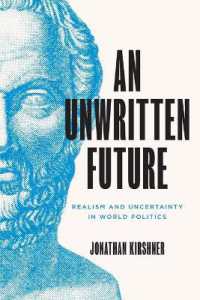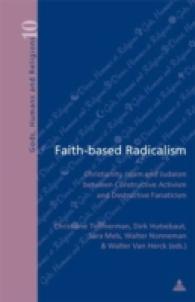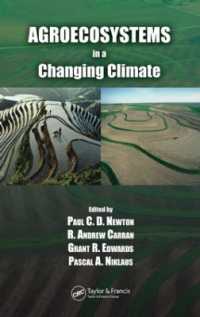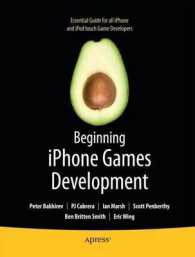- ホーム
- > 洋書
- > 英文書
- > Psychology
Full Description
The Science of Religion, Spirituality, and Existentialism presents in-depth analysis of the core issues in existential psychology, their connections to religion and spirituality (e.g., religious concepts, beliefs, identities, and practices), and their diverse outcomes (e.g., psychological, social, cultural, and health). Leading scholars from around the world cover research exploring how fundamental existential issues are both cause and consequence of religion and spirituality, informed by research data spanning multiple levels of analysis, such as: evolution; cognition and neuroscience; emotion and motivation; personality and individual differences; social and cultural forces; physical and mental health; among many others.
The Science of Religion, Spirituality, and Existentialism explores known contours and emerging frontiers, addressing the big question of why religious belief remains such a central feature of the human experience.
Contents
Part 1: Death
1. Dwelling Forever in the House of the Lord: On the Terror Management Function of Religion
2. Death anxiety and religious belief: A critical review
3. Face to Face with Death: The Role of Religion in Coping with Suffering
4. Near-Death Experiences: The Mystical Feeling of "Crossing Over" and Its Impact on Faith and Spirituality
Part 2: Freedom
5. Reactance and spiritual possibilities: An application of psychological reactance theory
6. Understanding the psychology of religion: The contribution of Self Determination Theory
7. A Goals Perspective on Religion and Spirituality
8. Religion and Spirituality, Free Will, and Effective Self-Regulation
9. Authenticity and the True Self in Religion and Spirituality
10. Freedom as a Cross to Bear: Choice-Overload, the Burdens of Freedom, and the Benefits of Constraint
Part 3: Isolation and social identity
11. Social Ostracism, Religion, and Existential Concerns
12. The holy grail of connection: I-sharing, existential isolation, and religion
13. An attachment theory perspective on religion and spirituality
14. A social identity approach to religion: Religiosity at the nexus of personal and collective self
15. Religion and the construction of identity
Part 4: Systems of meaning
16. Truth and significance: A 3N Model (needs, narratives, networks) perspective on religion
17. Existential Uncertainty and Religion
18. Cosmic dad or Cthulhu: Why we will always need (religious) absolutes
19. Religiousness and meaning making following stressful life events
20. Meaning, religious/spiritual struggles, and well-being
Part 5: Mechanisms, variations, and individual differences
21. In His Own Image: An Existential Evolutionary Perspective on the Origins and Function of Religion
22. Fear Not: Religion and Emotion Regulation in Coping with Existential Concerns
23. Existential Givens, Religion, and Neuroscience
24. The Existential implications of individual differences in religious defensive and growth orientations: Fundamentalism, quest religiosity, and intrinsic/extrinsic religiosity
25. Existential Therapy, Religion, and Mindfulness
Part 6: Applications and controversies
26. Science and religion: A rocky relationship shaped by shared psychological functions
27. Of Flesh and Blood: Death, Creatureliness, and Incarnational Ambivalence towards the Divine
28. Religion: More essential (and existential) nutrient than opiate for the masses
29. Politics and Religion: Commutable, Conflicting, and Collaborative Systems for Satisfying the Need for Order
30. The Paradox of Faith: How Existential Concerns Motivate both Prosocial and Antisocial Religious Behaviors
31. Religion and Health: Building Existential Bridges








